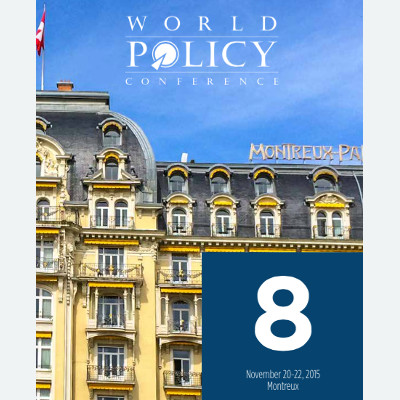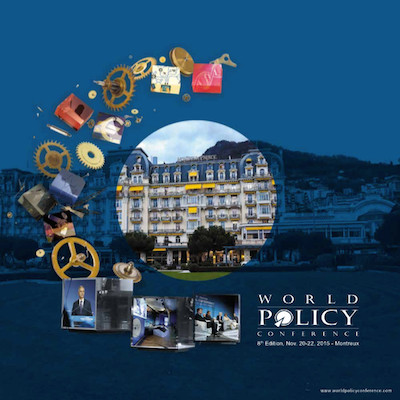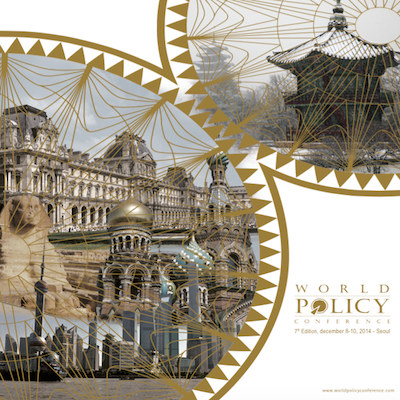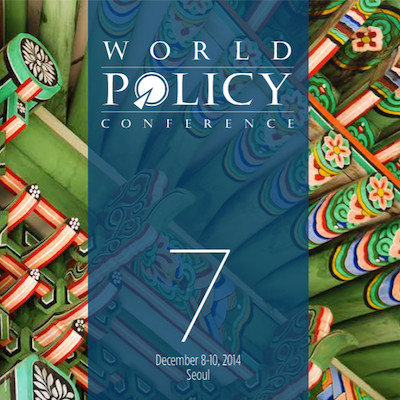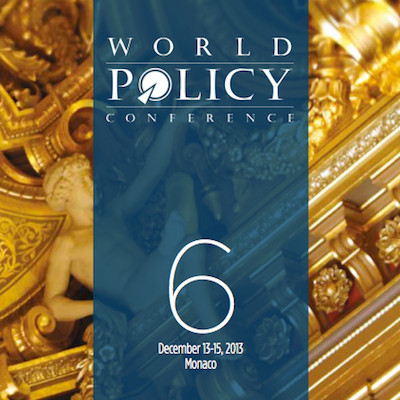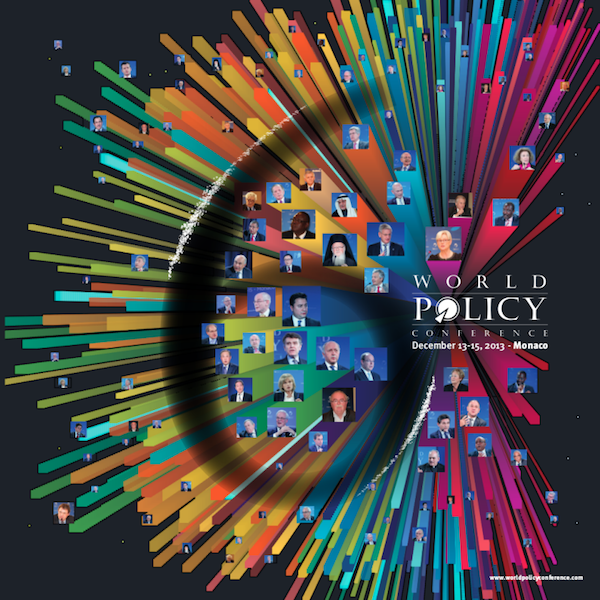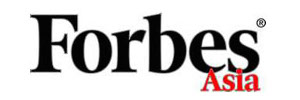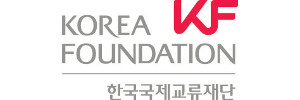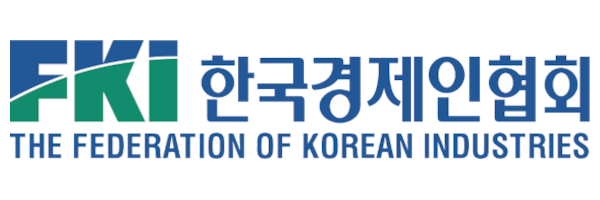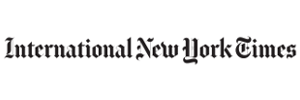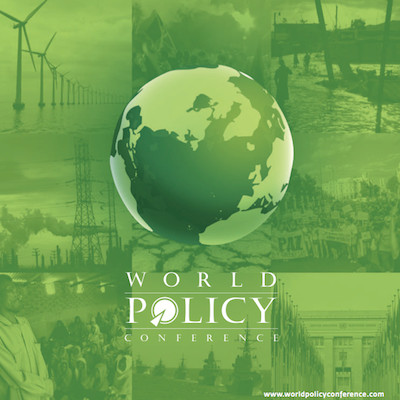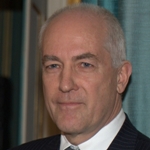2015 Report
Unicredit Bank
LafargeHolcim
Koç Holding
2015 Agenda preview
08:30 – 10:00
Opening session
10:00 – 11:15
Plenary session 1: Global economic order at the Crossroads
11:15 – 11:30
Coffee-break
11:30 – 12:45
Plenary session 2: The future of central banking
13:00 – 14:30
Lunch
14:45 – 15:45
Plenary session 3: Trade Agreements from the Viewpoint of Middle Powers
15:45 – 17:00
Plenary session 4: Do Firms have a Nationality?
17:00 – 17:30
Coffee-break
17:30 – 19:30
Plenary session 5: The future of the Middle East
20:30
Dinner debate
08:00 – 09:30
Plenary session 6: Security in Asia in a Historical Perspective
09:30 – 10:00
Coffee-break
10:00 – 10:45
Plenary session 7: Peaceful coexistence of religions?
10:45 – 12:15
Plenary session 8: Food and water security
12:30 – 14:00
Lunch debate with Planning Staff Directors
14:15 – 15:00
Plenary session 9: Israeli-Palestinian dialogue
15:00 – 16:15
Plenary session 10: The global challenges of the digital technologies
16:30 – 19:30
Parallel workshops
Workshop 1: Energy
Workshop 2: Economy and Finance
Workshop 3: China
19:45 – 20:15
Cocktail
20:15
Gala dinner
08:00 – 08:45
Reports from parallel workshops
08:45 – 09:45
Plenary session 11: Health and global governance
09:45 – 11:30
Plenary session 12: Climate and Environment
11:30 – 11:45
Coffee-break
11:45 – 13:30
Plenary session 13: Europe’s refugee crisis
13:45 – 15:00
Lunch debate
15:00 – 17:00
Plenary session 14: Final debate
17:00
Envoi
2015 Themes
Session 1: Global economic order at the Crossroads
The revolution in information technologies and the geographical redistribution of economic power, in particular the emergence of China and weakening of the European Union, have led to a correction in the economic order resulting from the Second World War. Examples of this change are the rise of the G20 following the 2007-2008 crisis, and the weakening of trade multilateralism in favour of bilateral or plurilateral agreements.
Many observers are placing increasing importance on “geoeconomics”, understood as the intersection of international economics and geopolitics.
For example, the Chinese initiative to create the AIIB (Asian Infrastructure Investment Bank) should be analysed from this perspective. Growing interest in “geoeconomics” is also based on the increased importance of sanctions as a means of action in international relations. More thoroughly, one could argue that, despite appearances, certain aspects of globalisation might be in peril. Without ignoring the cyclical aspects of the global economy, the primary purpose of this session is to shed light on this fundamental question.
Session 2: The future of central banking
Since the crisis occurred, Central banks of large advanced economies have embarked on very accommodating conventional and unconventional monetary policy. What is the meaning of this persistent situation, more than eight years after the start of the subprime crisis and more than seven years after Lehman Brothers bankruptcy? In particular:
- – What are the unintended financial and real economy consequences of such a long standing high level of monetary accommodation in the advanced economies?
- – What is the likely impact, in particular on volatility of global financial markets, on the global economy and on emerging economies, of the progressive withdrawal of monetary stimulus that is presently proceeding in the United States?
- – Are we experiencing a kind of “new normal” monetary policy required by persistent adverse new economic and financial structural features of the advanced economies?
- – Are there key “fundamentals” of Central Banking that should be kept in mind in all circumstances (like central bank independence, medium and long term price stability goal, financial stability etc.)?
Session 3: Trade Agreements from the Viewpoint of Middle Powers
The objective of this session is to conduct a closer analysis of trade issues resulting from the structural transformations examined in session 1, through the experience of two “middle powers”: Korea and Canada.
Session 4: Do Firms have a Nationality?
In the enthusiastic early days of globalisation, it was fashionable to speak of “global corporations” as entities independent from national political ties, as if for example AT&T, Google or Amazon, Toyota, Samsung, Volkswagen or Michelin, were operating in a world where borders had been irreversibly removed. The aim of this session is to examine to what extent the ideology of globalisation should be revised in this regard.
Session 5: The future of the Middle East
The fall of the Soviet Union, and with it the Russian Empire, reopened the situation in the Middle East – in its wider sense, including, for example, Libya. Accumulated strategic errors have led to chaos and the growth of terrorism, the primary victims of which are regional populations but which also directly and strongly impact the interests of traditionally involved external powers, such as the Europeans and Russia. Among the most surprising and in many respects anachronistic recent developments is the meteoric rise of the so-called “Islamic State”. However, the nuclear deal with Iran opens the prospect of the country returning to the “Concert of Nations”, even if, in this instance, the established powers are still demonstrating many more signs of opposition than possible convergence. During this session, attended by some of the principal protagonists, attempts will be made to answer the following question: are we moving towards a trend of less or more chaos in the Middle East?
Session 6: Security in Asia in a Historical Perspective
The rise of China is without doubt the main geopolitical phenomenon in Asia, and historical experience, of which there is an abundance in this regard, shows that this type of situation often leads to war. In the current context, Asia is suffering from an institutional deficit in terms of regional security, made all the more regrettable by territorial disputes being coupled with formidable psychological confrontations, particularly between Japan and its Chinese and Korean neighbours. During this session, which will include the participation of eminent representatives from the region, we will attempt to take a step back and examine the chances of a reduction in tensions so as to limit the risk of accidental conflicts with a potentially devastating global impact.
Session 7: Peaceful coexistence of religions?
The political importance of religions is derived from their decisive role in structuring the identity and culture of peoples. Contemporary history shows that, when manipulated by fanatical leaders, they can still serve the cause of the most barbaric wars. Multiethnic or multireligious countries which manage to maintain a balance thanks to a climate of respect and tolerance are worthy of the attention of those concerned about the scourges of the modern world. Among these, Benin in Africa is a remarkable example.
Session 8: Food and water security
Food and access to drinking water are the primary conditions for health and development. Malnutrition and the unavailability of water of sufficient quality and quantity are at the root of lethal conflicts and uncontrollable migration. The solution to these problems is the province of political geography, but also of economic organisation and technology. This panel discussion will examine all aspects of the issue, with particular attention paid to Africa from a geographical point of view.
Session 9: Israeli-Palestinian dialogue
Close to seven decades since the creation of the Hebrew State, the Israeli-Palestinian conflict looks like a perpetual war. Is there any chance for a settlement in the foreseeable future?
Session 10: The global challenges of the digital technologies
Far from slowing down, the revolution in information technologies continues at a frenetic pace. The Internet of Things, increasingly sophisticated robotisation, drones and 3D printing make the concept of the border a little more blurred with each passing day and open entirely new perspectives – positive but also negative – on globalisation, and the implications for global governance, in particular legal and ethical issues, merit exploration without delay.
Session 11: Health and global governance
During this session, which complements session 8 but also session 10, we will examine the positive prospects for health opened by the technological revolution and globalisation, but also any associated risks and ways of countering them.
Session 12: Climate and environment
This session will examine the issue of climate with the immediate prospect of COP21, and will explore three fundamental, long-term questions. Firstly, the role of enterprises. Secondly, the ethical dimension is of primary importance, since the stakes are nothing less than how the action of humans will affect the future of the Earth. Thirdly, negotiations on climate are undoubtedly only a first example of situations which are likely to multiply, where diplomacy will be immediately required to tackle problems that are increasingly truly planetary in scale. Despite not inconsiderable expertise in multilateralism, we are still seriously lacking in experience when it comes to this kind of complexity.
Session 13: Europe’s refugee crisis
In terms of its current and potential scale, this crisis is comparable to those which affected the continent in the aftermath of the two global conflicts of the 20th century, but with three differences. Firstly, in this instance we can more clearly see the conjunction of specifically economic causes and geopolitical causes. Secondly, current migration flows are being reinforced by use of communication technologies. Thirdly, immigrants are coming from a range of different civilisations. To this is added the risk of the infiltration of individuals belonging to terrorist groups, at a time when the threat is high in Europe. This crisis therefore represents a major challenge for the European Union. The nature of these causes means that other parts of the world could experience comparable challenges. This session is related in an obvious way to session 5.
Session 14: Final debate
This final, traditional session will be used to draw conclusions from all of the discussions held over the three days and to complete them with any topical points not sufficiently dealt with at the time.
2014 Themes
Opening Session
Thierry de Montbrial, President and founder of the WPC
Park Geun-Hye, President of the Republic of Korea
Session I. The Organisation of Security in East Asia and Europe
In Asia, the major development has been the rise of China, which caused all players in the region to reposition themselves, in particular with respect to the United States, while the wounds inflicted by History remain unhealed. Unlike Europe, East Asia did not inherit any security-related structures from the past. In Europe, however, those that exist could be destroyed by the Ukrainian crisis, nearly forty years after the Helsinki Conference. How can the potentially-disastrous developments of the day be countered in order to maintain peace on the Eurasian continent?
Session II. The Outlook for the Korean Peninsula and Northeast Asia
This session will pick up where the previous one left off, focusing on Northeast Asia and the future of the Korean peninsula. In particular, we will endeavour to review the reunification scenarios and diplomatic initiatives, especially those put forth by Korea, likely to facilitate them.
Session III. Inequalities and Globalisation
The rampant rise of inequalities has stirred lively discussion across all continents and provides fodder to all those opposed to globalisation and, more broadly speaking, capitalism. During this session, we will aim to lay out the problem and identify the governance measures most appropriate and attainable in this area. The session will give pride of place to the institutional points of view (OECD and IMF).
Session IV. Conversation with Prince Turki Al Faisal of Saudi Arabia
Session V. Africa in a Global Setting
Africa is one of the recurring themes of WPC events. While the continent’s development prospects remain considerable, it is important not to underestimate the difficulties with which it is grappling, including epidemics and, in some States, terrorism. Emphasis this year will be placed on relations between Africa and Asia.
Session VI. Geopolitics and Geo-economics in Eurasia
Questions around Eurasia have attracted a great deal of attention over the past quarter-century. However, there is no single definition as to what the term implies. The Eurasian continent can be described in geographic terms as one extending from the European coastline in the west to the Eastern fronts of Russia and China in the East. However, this is by no means what Russia has in mind when it refers to an Eurasian Union. The latter’s purely geopolitical view can be likened to the Monroe Doctrine. Meanwhile, Korea has taken a rather geo-economic perspective, looking first and foremost to the construction or reconstruction of lines or groupings with trade purposes. The aim of this session will be to clarify the intentions underpinning each project.
Session VII. Trade and Policy
Commercial affairs, in the broad sense of the term, have always been a central part of international relations and always interfered with security issues. In our day and age, as a result of globalization, economic exchanges have gone largely beyond commercial exchanges (services, capital flows, direct investments, etc.) and form a more and more tightly-meshed network. The objective of this session will be to: consider the economic and political implications of today’s waning multi-lateralism alongside the mushrooming of often-competing bilateral agreements; take stock of the major negotiations underway, such as the TTIP and TPP; and also to address the problem of economic arms (sanctions) in international relations.
Session VIII. The Middle East in a Global Setting
Since the last WPC in Monaco, the situation has consistently deteriorated in the Middle East, with the unexpected emergence of the “Islamic State”. The aim of this session will be to: explain this strategic surprise; analyse the behaviour of the main players, both outside the region (including the United States, the European Union and Russia) and inside (Turkey, Iran, Egypt and Israel); take stock of the nuclear negotiations underway with Iran; and last but not least, exchange views on what lies ahead. One particular painful aspect of this dramatic situation, the future of the Christian minorities, should be discussed.
Session IX. The Economic and Political Consequences of the Big Data Revolution
The Big Data revolution is turning each and every business model on end. Where industrial organisation is concerned, it holds a risk that industrial companies (in the broadest sense of the term, in other words, including for instance insurance companies or, more generally speaking, service companies) are fated to be dependent on a Big Brother like Google. From the political standpoint, one of the main issues has to do with the relations between Big Brothers and Nations themselves, first and foremost, the United States. The question of Big Data necessarily calls for the issue of State industrial policies to be reframed. In particular, are we headed for a duopoly between China and the United States in these areas?
Session X. Conversation about the Role of China-US Relations in the World Order
Session XI. Open Discussion
As has become traditional at this annual event, the final plenary session will be dedicated to open discussion about the latest news and topics discussed during the conference.
2014 Report
2014 Conference proceedings
09:15 – 10:00 | Opening session
Thierry de Montbrial
President and founder of the WPC
We aim to contribute to improving all aspects of local and regional governance, with a view to promoting a world that is more open, more prosperous, fairer and more respectful of the diversity of states and nations.
Park Geun-Hye
President of the Republic of Korea
I believe that building a framework of trust and cooperation on the Korean Peninsula and in East Asia will be crucial for a more peaceful and secure future for our world.
10:00 – 11:30 | Plenary session 1
“Security governance in East Asia and in Europe”
Introduction by Thierry de Montbrial
President and founder of the WPC
Jean-David Levitte
Distinguished Fellow, Brookings Institution
In my view, the US, both in Europe and Asia, has to play the role of balancing power, like the UK did in the 19th century in Europe.
Richard Haass
President of the Council on Foreign Relations
Asia is a much more complex geography than Europe with much less institutionalism and it is much more about territorial and other kinds of disputes.
Han Sung-Joo
Former Republic of Korea’s Minister of Foreign Affairs
With its rebalancing policy, the US appeared to be placing more weight on its Asia policy and presence, but it now finds itself with problems elsewhere around the globe from which it cannot easily pivot away.
Igor V. Morgulov
Deputy Minister of Foreign Affairs of the Russian Federation
In the time of a fundamental transformation of the system of international relations, the world faces growing number of conflicts and challenges.
Shotaro Oshima
Chairman, Institute for international Economic Studies (IIES) and Visiting Professor, Graduate School of Public Policy, University of Tokyo
One of the most important elements in East Asia is obviously the rise of China, and it is creating certain instabilities in the region.
Debate
11:30 – 13:00 | Plenary session 2
“Prospects for the Korean Peninsula and Northeast Asia”
Introduction by Choi Young-Jin
Professor at Yonsei University Graduate School of International Studies; former Ambassador to the US; former Head of the UN Mission in Côte d’Ivoire.
The rise of East Asia will be recorded in history as the most significant phenomenon of the second half of the 20th century, along with the Cold War.
Thomas Bagger
Head of Policy Planning, German Federal Foreign Office
I think the German/Korean relationship is far broader than the rather superficial similarity of having a history of division, but it is quite interesting that we come back to this issue of division and unification on the Korean Peninsula.
Ju Chul-Ki
Senior Secretary for Foreign Affairs and National Security, Office of the President of the Republic of Korea
Unification can be the silver bullet to resolving many of the key challenges that plague the Korean Peninsula such as the nuclear issue, human rights abuses, and North Korea’s social economic challenges.
Thierry Mariani
French Member of Parliament for French Citizens Abroad (Asia, Russia, and Oceania)
The economic dynamism of Northeast Asia except, of course, North Korea, has enabled them to carry weight on the international stage. South Korea is an example.
Marcus Noland
Executive Vice President and Director of Studies, Peterson Institute for International Economics
The first scenario is one side conquers the other one militarily. The second one is that the peninsula experiences a peaceful, gradual consensual unification that is measured in decades […] The third possibility is […] an abrupt German-style collapse of the North and its absorption by the South.
Anatoly Torkunov
Rector of the Moscow State Institute of International Relations
The Korean Peninsula remains the hub of bilateral, regional and global problems.
Debate
13:15 – 14:45 | Lunch debate
Introduction by Thierry de Montbrial
President and founder of the WPC
Lee Hong-Koo
Former Prime Minister of the Republic of Korea
The most crucial requirement is to bring the major powers together to guarantee the peaceful coexistence of two Korea working together towards an eventual unification.
Conclusion by Thierry de Montbrial
President and founder of the WPC
15:00 – 16:30 | Plenary session 3
“Inequalities and globalization”
Introduction by Susan Liautaud
Visiting Scholar at the Stanford Center on Philanthropy and Civil Society; Founder of Susan Liautaud & Associates Limited (SLA)
Our topic for this 90‑minute session is vast and it is inequality and globalisation. It is indeed a topic that Christine Lagarde and others have called one of the most important stories of our time.
Mari Kiviniemi
Deputy Secretary General of OECD; former Prime Minister of Finland
Inequality is not only bad socially, ethically and on a human level, it is also bad economically.
Rhee Changyong
Director, Asia and Pacific Department, IMF
We have to be very careful when we talk about inequalities. It is not about inequality in general; it is more about inequality in opportunities, and excessive inequality is quite detrimental to growth.
Richard Cooper
Professor of International Economics at Harvard University
The Gini coefficient is a very clever coefficient, but it is a single number, and inequality is typically much more complicated than can be captured in a single number.
Il Sakong
Chairman of the Institute for Global Economics; former Finance Minister of Korea
Income and wealth inequality have been rising throughout the world during the last three decades or so, particularly in the advanced economies.
Jean Pisani-Ferry
General Commissioner for Strategy, Office of the Prime Minister, France
The WTO and the IMF are increasingly concerned about inequality. Paradoxically, the EU, which is a political institution with a mandate in the treaties of improving the whole of society, has proved relatively indifferent to these issues of inequality.
Debate
16:30 – 17:15 | Plenary session 4
Introduction by Thierry de Montbrial
President and founder of the WPC
H.R.H. Prince Turki Al Faisal
Chairman of the King Faisal Center for Research and Islamic Studies (KFCRIS)
Governance in Libya, Yemen, Tunisia, Egypt and Syria is in such a tenuous condition, and the perfect conditions for terrorist cells to take root […]. This is something that will continue to happen as long as we do not treat the illnesses and continue to treat the symptom. The main disease in that area is the failing states.
Debate
17:15 – 17:45 | Coffee-break
17:45 – 19:15 | Plenary session 5
“Africa in a global context”
Introduction by Marie-Roger Biloa
CEO, Africa International Media Group
Nowadays, conversations about Africa no longer tend simply to vilify it as hopeless, but instead highly praise its economic progress and golden business opportunities.
Wu Jianmin
Executive Vice Chairman of China Institute for Innovation and Development Strategy
Asian countries have been very active in Africa’s rise, and in the 21st century, Afro-Asian solidarity will play a very important role.
Lynda Chalker
Founder and Chairman of Africa Matters Ltd; former UK Minister for Overseas Development and Africa
We are beginning to see a real combination of experience being shared from Asia into Africa, and with third countries too.
Nathalie Delapalme
Executive Director, Research and Policy, Mo Ibrahim Foundation
There is no doubt about the narrative of the African rising, but I still think that the economy is not the only measurement; we should be careful not to be overly optimistic, but should take into account the early warning signs of insecurity, domestic unrest, inequality and jobless growth.
Youssef Amrani
Chargé de mission, Royal Cabinet, Morocco
Africa must take its future in its own hands, overcome the barriers to its socio-economic development and create jobs for its youth, who are the continent’s real driving force.
Elisabeth Guigou
President of the Committee on Foreign Affairs of the French National Assembly
Europe must become more aware that its security depends on what happens in the Sahel.
Debate
20:00 | Dinner debate
Introduction by Thierry de Montbrial
President and founder of the WPC
Yun Byung-Se
Republic of Korea’s Minister of Foreign Affairs
A reunified Korea will be nuclear weapons-free; a beacon for human rights and democracy; at peace with neighbors; an engine of global economic growth; and a promoter of regional and global peace and prosperity.
Conclusion by Thierry de Montbrial
President and founder of the WPC
08:30 – 11:30 | Parallel workshops
Workshop #1 – The state of the world economy and finance
Introduction by Jean-Claude Trichet
Former President of the ECB
We’re still living in the shadow of the deepest economic crisis since the Second World War. It might have been even worse had central banks and governments not taken extraordinarily bold, swift steps.
Jeffry Frieden
Professor of government at Harvard University
There are major political and economic blocks to a resolution of the crisis in Europe, which causes concern both in Europe and around the world.
Yutaka Aso
President, Aso Group
The strong intention of Governor Kuroda of the Bank of Japan is working. He says the bank will do whatever it can to overcome the deflation that has long undermined Japanese economy.
Daniel Daianu
Member of the Romanian Academy; former Minister of Finance of Romania
Extreme events keep us under constant pressure. All this is very bad because there are economic, institutional, social, and political entailed costs; these costs show up in individual mindsets and in the collective psyche of people.
Debate 1
Jun Gwang-Woo
Former Chairman of Korean Financial Services Commission (FSC)
In general, older people tend to have a low risk tolerance and not aggressively engage in venture type investment. So, the result is: saving more, spend less and prefer safer assets.
Bozidar Djelic
Partner, Lazard; former Deputy Prime Minister of Serbia
There is no commonly agreed model, where all the banks would in the same way use the same model.
Marek Belka
President of the National Bank of Poland
I do not think that we have really experienced a full-blown currency war which some of the colleagues, say, from Brazil, were quite concerned about.
Debate 2
Workshop #2 – Energy, climate change and environment
Richard Cooper
Professor of International Economics at Harvard University
I will give my own pessimistic view about the COP process we are involved in. I do not see how 193 countries with a huge diversity of interests can reach a meaningful agreement – the word ‘meaningful’ is important – by a process of consensus.
Laurent Fabius
Action is possible. Greenhouse gas emissions must be cut; that’s where energy comes in. We must reduce our reliance on fossil fuels, save more energy and use more renewable sources.
Vuk Jeremic
Former President of the UN General Assembly; former Minister of Foreign Affairs of Serbia
Global problems require global awareness for global solutions […] It is an illusion to believe that negotiations on post-2015 agenda and climate change can take place in isolation from general international trends.
William Ramsay
Senior Advisor of the Center for Energy, Ifri; former Deputy Executive Director, International Energy Agency (IEA)
We cannot emit any additional CO2 from 2040 if we want to achieve the two-degree target, which is not particularily realistic.
Debate 1
Bertrand de la Noue
General Representative of Total in China
Energy companies have for a long time been quite mute on the climate debate. […] Total has been over the past years at the forefront of a profound change in industry response.
Tatsuo Masuda
Professor at Nagoya University of Commerce and Business Graduate School, Japan
Energy and environmental challenge is symbolically seen in Asia, where some 60% of the global increment of energy demand growth up to 2040 will take place.
Luigi Colantuoni
Group Representative of Total in Japan and South Korea
Climate change and energy transition are considered major issues for the world economy and for the sustainable future of humankind.
Debate 2
Christian Bréchot
President of the Institut Pasteur
Eco-epidemiological impacts are extremely important. There will be increasing health risks from natural disasters and increasing health challenges linked with human displacement.
Sverre Vedal
Professor, University of Washington (UW) School of Public Health; Chinese Research Academy of Environmental Sciences (CRAES)
While most air pollutants are climate warming, some important ones are climate cooling, and that complicates mitigation strategies.
Debate 3
Lee Seung-Hoon
Professor emeritus of the Seoul University; former Co-Chairman of Green Growth Committee of the Korean government
With tools energised by fire, greedy mankind has built up astounding prosperity on the one hand, and degraded the environment to the level of destruction on the other.
Anil Razdan
Former Power Secretary of India
The OECD said in 2010 that seven out of ten world cities most exposed to climate change are in developing Asia.
Debate 4
Workshop #3 – Agroindustry in Africa and Asia
Introduction by Jean Yves Carfantan
Senior Consultant, AgroBrasConsult
Suresh Kumar
Chief Editor of Africaindia.org; former Head and Director of the Department of African Studies, University of Delhi
Agriculture extension is an important component of agriculture universities throughout the world, which will help Africa Agriculture Education System to strengthen in rural areas.
Khalid Meksem
President of the University Mohammed VI
The pre-colonial part of agriculture in Africa was sustainable, local and harmonious. […] people who are interested in sustainability today will fly to remote locations in Africa and learn from the locals.
Debate 1
Krishan Jindal
CEO, NABARD Consultancy Services Pvt. Ltd.
NABARD has been able to facilitate credit flow to agriculture and also helped in adoption of technology by small farmers to operate in a profitable and sustainable way.
Debate 2
Rod A. Wing
Professor, University of Arizona
The greatest challenges that we face in plant breeding is to be able to link genome sequences to functional traits that could be used to create superior and sustainable varieties.
Philippe Chalmin
Professor, Paris-Dauphine University
Debate 3
11:30 – 11.45 | Coffee-break
11:45 – 13:15 | Plenary session 6
“The geopolitics and geo-economics of Eurasia”
Introduction by Fen Osler Hampson
Director of CIGI’s Global Security & Politics program; Co-director of the Global Commission on Internet Governance; Chancellor’s professor at Carleton University in Ottawa, Canada
I think that it is important to note that the Eurasian region has witnessed a number of cooperative governance initiatives in both the economic and security spheres.
Michel Foucher
Chair of applied Geopolitics at College of World Studies; former French Ambassador to Latvia; former Director of the policy planning staff of the French Foreign Ministry
The reference for the Eurasian economic union is the European Union. It’s cut-and-paste in formal and institutional terms.
Dong Manyuan
Vice President, China Institute of International Studies (CIIS)
President Xi Jinping proposed a cooperation initiative through the Silk Road economic belt cooperation initiative. It brings about new opportunities for economic cooperation on the Eurasian continent and has been welcomed by the majority of countries that lie alongside the continent.
Alexander Panov
Member of the Advisory Board of the Security Council of the Russian Federation
There are a number of projects in which Moscow, Seoul and Pyongyang are already involved in, particularly those in the transport and energy sectors.
Justin Vaïsse
Director of the policy planning staff, French Ministry of Foreign Affairs
If the European Union and the Eurasian Union discussed common economic projects and trade, we’d see that as something very positive, because it would add to South Korea or China’s efforts to develop the region.
Yu Myung-Hwan
Chairman of Sejong University; former Republic of Korea’s Minister of Foreign Affairs
South Korea’s Eurasia Initiative is still at a very nascent stage […] and is trying to implement the Eurasia Initiative with forward-looking and creative thoughts.
Debate
13:30 – 15:30 | Lunch debate
“What about American leadership?”
Part 1
Americans never had full hegemony. There is a bit of a myth about the past, that there was a period when the Americans could do anything and now we can do nothing, and the truth is somewhere in between.
Part 2
Giving more resources to Ukraine is a good idea in principle, but the problem is that in practise, there is zero evidence that more resources will be used well.
Part 3
I do not think we are on the verge of a great détente with Iran, because there are too many interests where there is divergence.
Part 4
China quite simply does not use the influence it has to rein in either North Korea’s nuclear programme, or more broadly, North Korean behaviour. There is a sense that China could and should do more, not to control North Korea, but to influence it.
15:30 – 17:00 | Plenary session 7
“Trade and politics”
Introduction by Patrick Messerlin
Professor of Economics and Director of the Groupe d’économie mondiale (GEM) at Sciences Po Paris
Many people tend to believe, and yesterday we had this impression, that trade and politics are a source of increasing conflicts and interactions.
John Manley
President and CEO, Canadian Council of Chief Executives
The world is increasingly complex, and our political economies are all engaged in dealing with a myriad of very deep and difficult issues.
Alejandro Jara
Senior Counsel, King & Spalding; former Ambassador and Permanent Representative of Chile, WTO
The trade agenda is increasingly intrusive and touches upon very sensitive domestic political issues in many countries.
Bark Taeho
Professor at Seoul National University; former Minister for Trade, Korea
The current consensus-based decision making mechanism of the WTO faces serious limitations. We have to discuss honestly how to save the Doha Round with all options open.
Pascal Lamy
Honorary President of Notre Europe; former Director-General of the WTO
The relationship between trade and politics, whether domestic or international, is fundamentally changing as we are transitioning from an old world of trade into a new one, and we are somewhere in between these two worlds.
Debate
17:00 – 18:30 | Plenary session 8
“Middle East in a global context”
Introduction by Dominique Moïsi
Special Advisor at Ifri
I would say there are three words that characterise the ‘new’ new Middle East: fragmentation, […] radicalisation, […] and expansion.
Hubert Védrine
Former French Minister of Foreign Affairs
Turmoil and problems have been rocking the Middle East for 50, 70, even over 100 years!
Ribal Al-Assad
Chairman of the Iman Foundation
We saw the rise of the Islamic State as ISIS in 2006, but it came to Syria because there was a certain atmosphere that allowed it to prosper, that allowed it to grow.
Meir Sheetrit
Member of the Knesset; former Minister of Internal Affairs of Israel
Many countries at last understood that Israel was standing alone in fighting terror, and now we are fighting together against radical Islam.
Sergei Karaganov
Honorary Chairman of the Presidium of the non-governmental Council on Foreign and Defense Policy of Russia
Stop exporting democracy or socialism or whatever, and, by the way, stop ostracising Israel. It is the only beacon of stability there, and we see more and more ostracising of Israel.
Miguel Angel Moratinos
Former Minister of Foreign Affairs of Spain
I think the Middle East deserves all this time, because it is the quintessence of the new challenging world, where all traditional security concerns, traditional military intervention, energy and trade converge in the new challenges of today’s world, which are global terrorism, food security, water scarcity, and culture division.
Debate
19:15 | Cocktail
09:00 – 10:00 | Reports from parallel workshops
Jeffry Frieden
Professor of government at Harvard University
There have been some notable steps forward in cooperative measures among the major financial and economic centres, especially with respect to the harmonisation of financial regulation. At the same time, the global macroeconomic situation remains quite troubled and quite troubling, with Europe being the most worrisome cause for concern.
Marie-Claire Aoun
Director of the Energy Centre at Ifri
To be successful, the fight towards climate change should reflect local, regional and global alliances, including private sector, and civil society and should be driven by a strong and sustainable political will.
Jean-Yves Carfantan
Senior Consultant, AgroBrasConsult
In the small group that was present at the workshop, we did believe that increasing production in the farm sector in Africa is one of the main challenges the world is faced with in the coming years.
Debate
10:00 – 11:30 | Plenary session 9
“The economic and political consequences of the revolution of Big Data”
Nicolas Barré
Managing Director, Les Echos
In 2000, that is less than 15 years ago, only a quarter of the existing data in the world was digital and today it is almost 100%.
Chang Dae-Whan
Chairman of Maekyung Media Group, Republic of Korea
Now that we are entering the world of IoT, Internet of Things, our everyday lives will change. The Internet of Things is a new, emerging power.
Luc-François Salvador
Executive Chairman for Asia-Pacific, Capgemini Group
We should see the impact of the big data revolution from different aspects and in different areas, touching all domains of our private, professional lives as well as citizens.
Ben Scott
Senior Advisor, Open Technology Institute at the New America Foundation; Program Director, European Digital Agenda, Stiftung Neue Verantwortung
We have to convince people that the Internet offers more benefits than risks. Not just today, but tomorrow and in 15 years and, to do that, we need to establish legitimacy at least for democratic governments and their conduct online.
Joseph Nye
University Distinguished Service Professor, Center for Public Leadership, Harvard Kennedy School
When you have the capacity of computing power doubling every 18 months, the ability to analyse data has outgrown our social mores and norms and laws, which set limits on this in the past.
Debate
11:30 – 12:00 | Coffee-break
12:00 – 13:00 | Plenary session 10
“The US and Asia in the 21st century”
Robert M. Gates
Former Secretary of Defense of the United States
People talk a lot about the emergence of China, when I think it is more accurate and provides greater historical context to talk about the re-emergence of China.
13:15 – 14:45 | Lunch debate
Conclusion by Thierry de Montbrial
President and founder of the WPC
Mehmet Ceylan
Deputy Minister of Development of Turkey
The rise of Turkey’s economy is much admired because of the fact that it goes hand in hand with democratic and modern values.
Debate
15:00 – 17:00 | Plenary session 11
« General debate »
Introduction by Dominique Moïsi
Special Advisor at Ifri
Mohamed Laichoubi
Former Minister of Labor and Social protection of Algeria
The reorganisation of the world and the emergence of new players have made it clear that new instruments are necessary. Defining a new multilateralism has become an absolute necessity.
Jeffry Frieden
Professor of government at Harvard University
Global governance is only really justified if there are global public goods that cannot be supplied by national governments.
Liu Chen
Professor, China’s Foreign Studies University in Beijing
Thanks to the overall positive economic and political effects of the Reform and Opening up, the smoke has cleared in the state-market battle in China and there is an increased tendency toward connecting China with World.
Kunihiko Miyake
Research Director, The Canon Institute for Global Studies, Japan
The most important element is the rise of nationalism on the planet. Nationalism is back and I think that we should focus on how to control it.
Tobby Simon
Founder and Chairman, Synergia Foundation, India
Global warming and rising waters, caused by climate change is a major threat. Another consequence of global warming is the spread of diseases and emergence of multi-resistant strains.
Carlos Pérez-Verdia
Head of the Private Office of the Minister of Foreign Affairs of Mexico
In Latin America we have no significant religious, ethnical or cultural rivalries and no significant border disputes. We are therefore more or less absent from the debate on spheres of influence.
Michael Yeoh
Founder and CEO of Asian Strategy & Leadership Institute of Malaysia
Southeast Asia will continue to play a key role in the regional architecture of Asia and the hope is that we will become a middle power in the years to come.
Conclusion by Dominique Moïsi
Special Advisor at Ifri
Debate
2014 Program
2013 Program
2013 Conference proceedings
14:30 – 15:30 | Opening session
H.S.H. Prince Albert II
Sovereign Prince of Monaco
Democracy cannot be imposed but must be built progressively according to each State’s history.
Thierry de Montbrial
President and founder of the WPC
Regardless of whether today’s international system be described as zero-polar, bipolar or multipolar, the simple reality is that the most powerful states no longer wish or are no longer capable of exercising their power. It is, in my view, more constructive to focus on the ‘middle powers’.
Introduction by Thierry de Montbrial
Ali Babacan
Deputy Prime Minister of the Republic of Turkey
For many of our domestic reform efforts, the European Union has been a key external anchor. The standards, benchmarks and criteria that the European Union has for incoming countries are very important for us because it is a measure of quality of our reform efforts.
Debate
15:30 – 17:00 | Plenary session 1
“The state of the world economy and global governance”
Introduction by Nicolas Barré
Kemal Dervis
We need to pay more attention to income distribution, to how growth is taking place and to how it is spreading through societies.
Henri de Castries
We are probably seeing the end to the Westphalian states. Classical borders are becoming irrelevant in more and more areas.
Jacob Frenkel
The world’s centre of gravity has moved and that businessmen and entrepreneurs were able to recognise and seize these opportunities.
David de Rothschild
In 2014, there will be another round of stress tests and there will be another asset‑quality review. Therefore, I think that by the end of 2014, we will have a fairly stable environment in all this.
Il SaKong
The G20 should have more frequent and structured meetings for finance deputies, finance ministers and Sherpas before the Summit. Leaders’ time is the scarcest resource in the world, so they cannot meet often.
Pascal Lamy
We need to de‑monopolise international governance from the Westphalian system, from sovereign nation states. We need to look at greater diversity of public institutions.
Debate
17:00 – 17:45 | Plenary session 2
Mohammad Javad Zarif
We should never forget that trust is a two-way street. Today’s regional and international crises require every one of us to have a sense of responsibility and to cooperate with one other to rebuild peace and stability.
Debate with Ali Ahani
Ambassador of Islamic Republic of Iran to France and to Monaco
17:45 – 19:15 | Plenary session 3
“Middle East”
Introduction by Steven Erlanger
Masood Ahmed
There has to be a focus on trying to give young people in particular some hope by giving them opportunities for employment in the short term. That means reallocating some spending towards job creation.
Renaud Girard
I believe that our leaders have not grasped the fact that in Syria, a very deep and profound fracture has existed for a very long time between a party that I would describe as secular and a Muslim Brotherhood party.
Bassma Kodmani
The djihadists’ best ally is the violence that was introduced by al-Assad. The djihadists’ best ally today is the chaos created by the regime.
Mona Makram-Ebeid
For Egypt to advance, it has to go back to the slogan of the 1920s, which was ‘Religion is for God and the homeland is for all’. Otherwise, there is no future.
Sergey Karaganov
Russia’s experience with Iranians has shown that they have been acting very constructively in calming crises in the former Soviet Central Asia and quite responsibly in calming crises in the Caucuses, including in Chechnya and elsewhere.
Elisabeth Guigou
I believe that Europe must return, that Europe must abandon its navel-gazing and start to assert itself in the world again.
Debate
19:15 | Welcome cocktail
20:00 | Dinner debate
With Herman Van Rompuy
President of the European Council
The simple idea that people should have a say in their own governance has achieved a near universal status, and more of the world’s population lives in democratic countries than ever before in the history of the mankind.
Debate
08:00 – 09:45 | Plenary session 4
“Asia’s strengths and weaknesses”
Introduction by Michael Yeoh
Bruno Lafont
Asia is rising and what is very interesting to see is the development of the cities in Asia. I think the most important trend in Asia today is harmonisation.
Jin Roy Ryu
I think one of Asia’s weaknesses is that Asia does not have a strong leader or control tower like the United States in the Americas.
Shotaro Oshima
Mr. Abe has put forward the case to the people that we should not have to be bogged down in deflationary mind-set and that we can change the economic environment and the outlook for the future by inflation target setting.
Mayankote Kelath Narayanan
There exist two Asias today – both competing for space and attention. Economically, we have a dynamic, and to an extent, integrated Asia. In security terms, there is another Asia that appears dysfunctional, buffeted by powerful nationalisms and prone to irredentism.
Anatoly Torkunov
Any diplomatic process is therefore only a tool to hedge risks by stopping North Korea from improving its nuclear arsenal and preventing nuclear proliferation. The basic underlying theory of the Russian policy of maintenance is the need for peaceful coexistence in the Korean Peninsula.
Yang Jiemian
Strength lies in the open regionalism. Looking around the world it is only in Asia where regionalism is open.
Debate
09:45 – 11:15 | Plenary session 5
“The challenges of the cyberspace”
Paul Hermelin
The main challenge of the infosphere is the discontinuity between the majesty of international governance and the way technical innovation blossoms.
Chang Dae-Whan
Interactions will be machine to machine. Society might prevail. We must be prepared for an end-to-end and machine-to-machine society.
Meir Sheetrit
Having technology is not enough. There are many, many things that can cause damage in a surprising way if somebody decides to attack you. It is not enough therefore to have technology. You need to have the right warriors.
Carl Bildt
A big battle ahead is going to be over whether we keep a global Internet and an open governance system or whether the Internet becomes balkanised. We will either have an open, transparent and dynamic Internet in the future or a closed, controlled and static one.
Debate
11:15 – 11:45 | Coffee-break
11:45 – 13:00 | Plenary session 6
“Whither the ‘European social model’?”
Introduction by Jim Hoagland
Joaquín Almunia
We need to improve our tax systems to be consistent with both growth and the need to fund the welfare state, our social policies and the social model.
Yves Leterme
Europe also has to be especially aware that, as the recent PISA report made clear, skills are the currency of the 21st Century and investments in social resiliency are therefore more important for Europe than investments in security.
Jean Pisani-Ferry
Instead of having to bet on the future growth rate and to tell people a definite figure which they will expect to get, it should be recognised that the ability to provide pensions is linked to the performance of the economy.
Didier Reynders
I think one-third of the next European Parliament could be comprised of Eurosceptics and populists who are against the European Union. If we do not take care of these issues at the European level we will have more and more difficulties. We need to politicise the European debate.
Debate
13:15 – 14:45 | Lunch debate
“The future of diplomacy”
Introduction by Jim Hoagland
Hubert Védrine – Part 1
To me, the real question of diplomacy tomorrow and the day after tomorrow is, how can diplomacy be conducted in age that believes in transparency?
Carl Bildt – Part 1
We feel the pulse of the world much more clearly and we can impact the pulse of the world more effectively with the new technologies.
Hubert Védrine – Part 2
I think there needs to be an almost philosophical shift in civilisation by saying, “There are some cases when secrets, or the length of time a secret is kept, or conditions of secrecy, are justified.”
Carl Bildt – Part 2
There now needs to be a kind of congruence between public diplomacy and the public image and the secret details and secret mechanics.
Debate
15:00 – 16:15 | Plenary session 7
“Destruction or metamorphosis of the legal order?”
Mireille Delmas-Marty
‘Coordinated sovereignism’ means that the separation of national orders would be gradually broken down by the circulation of norms and dialogue between judges, which would replace separation with coordination.
Stephen Breyer
There must be a common rule that every country can follow. There’s a concept in law called comity that requires harmony. Easier said than done.
Lord Mance
I have no sense at all that the United Kingdom’s legal system or we, its common lawyers, judges and courts, are about to be over-whelmed or lose our identity in the face of any outside threat.
Jean-Marc Sauvé
I do not give much credence to the destruction theory in the sense of a collapse in juridical orders. Globalisation lays claim to just as many juridical rules as it seeks to topple, if not the reverse, and these rules must be able to find expression in juridical systems.
16:30 – 19:30 | Parallel workshops
Workshop #1 – Energy and environment
Introduction by Christophe de Margerie
Cécile Maisonneuve
Maria van der Hoeven
At the global level we can see that the industrial sector is responsible for 37% of all energy savings in one of our new policy scenarios relative to the current policy scenarios, followed by transport at 31% and buildings at 26%.
André Caillé
Any energy industry has to satisfy what we called then our “four As” criteria. First, energy has to be available; second, accessible; third, never forget that, affordable; and, fourth, it also has to be acceptable.
William Ramsay
The US is on its way to energy, oil and gas self-sufficiency. I advisedly do not use the term ‘energy independence’.
Debate
Jun Arima
We need a smarter approach to do so, as well as a broader scope that features not only domestic but also global mitigation and a longer-term horizon with innovation.
Kevin Sara
We are talking to our first clients in Europe and I can tell you that our biggest challenge is not technical. It is political and regulatory. The regulations are just not set up to transport electricity over long distances.
Debate
Conclusion by Christophe de Margerie
Workshop #2 – The health and emerging risks
Introduction by James D. Wolfensohn
Christian Bréchot
We must understand that we will never have an end of infectious disease. We have a reservoir of disease that is endless. The point is not to dream of suppressing infectious disease; the point is to adjust the follow-up and global governance of this problem.
Richard Cooper
With modern technology and information and trade in weapons, we see increasingly that conflicts which historically would have been localised take on international significance.
Daniel Dāianu
It is good for citizens to be stimulated, even assisted to become more self-reliant. However, the optimal solution cannot be by resorting to social Darwinism.
Thomas Kirkwood
There is an enormous resource of mental capital in older people that simply goes to waste. It goes to waste because policies do not recognise how important it is to keep this mental capital engaged in society.
James D. Wolfensohn
The issues of healthcare, which comes up with this, and of paying pensions to the aged just distorts the systems that we have had up to now. Nowhere is this more critical than in the USA at this time, but it will be a global issue.
Debate
Workshop #3 – Food security
Introduction by Jean-Yves Carfantan
José Graziano Da Silva
Today, an estimated 840 million people suffer from chronic hunger and another 2 billion people suffer from micronutrient deficiencies. 26% of the world’s children are stunted. Malnutrition costs around 5% of the value of global growth domestic product.
Christopher Delgado
There should be increased attention to risk management and greater resilience, and the policy incentives we have should be shifted to promoting triple wins, that is, more productivity, better resilience and mitigation all at the same time.
Marcos Jank
Good policies for me are related to land property rights – which are extremely important in many countries – technology, productivity, gains in scale, and integration into food chains.
Debate
Mahama Zoungrana
The State alone, with all the good will in the world, cannot guarantee food security. In addition, civil society, which has a key role to play, but also and above all the private sector, must become increasingly involved.
Debate
Jane Karuku
African governments are not investing enough in African agriculture.
Brent Habig
There are a lot of ways to do agriculture and have agricultural growth but not necessarily benefit smallholders or drive improvements in food security. That is our agenda, to try to find the opportunity to work with businesses when there is overlap with social goals and objectives.
Debate
Workshop #4 – Finance
Introduction by Jean-Claude Trichet
John Lipsky
After all, one of the key problems highlighted by the crisis was not so much the details of regulation, but that many systemically-important institutions lay outside the regulatory framework.
Jeffry Frieden
We need something that could be called governance; that is for something above the level of the nation state, for some attempt to either cooperate among national authorities or to create a supra-national entity that could try to deal with some of these cross-border externalities.
Debate
Benoît Cœuré
We need to make the single supervisory mechanism work in a way which is genuinely European, so we want the supervisory board not to be a committee of national supervisors but to become a European institution as part of the ECB.
Marek Belka
We know from our own experience that if there is to be a real banking union the banks should be European, not national, but this is not easy.
Debate
Jacob Frenkel
Since the Central Bank must have the capabilities to respond very promptly to new developments, and since it must have timely and reliable information about the banking sector, it stands to reason that the responsibility for bank supervision should rest within the Central Bank.
Il SaKong
The imminent US Fed’s tapering QE should be brought to the G20 process, more specifically, the G20’s MAP.
Debate
19:30 | Cocktail
20:30 | Gala dinner
Introduction by Thierry de Montbrial
Laurent Fabius
Minister of Foreign Affairs of France
I personally do not think that China is becoming a warmonger. But it is a major power and a string of tensions could arise in the region in 2014. France will always work toward peace and security.
Debate
08:00 – 09:00 | Reports from parallel workshops
Cécile Maisonneuve
The world energy mix was made of 82% of fossil fuels thirty years ago; this figure remains the same today, and will decrease only to 75% in 2035. The real revolution will be to reach a truly different energy mix.
Richard Cooper
Democratic political systems these days have great difficulty making forward-looking decisions that would head off serious risks in the future, so we are likely to be confronted with shocks which we are not well-situated to handle, especially in the financial area.
Jean-Yves Carfantan
We need a climate smart agriculture that improves crop yields and livestock management to increase production, increases climate resilience of farming systems, reduces carbon emissions and increases soil carbon storage.
Jeffrey Frieden
There is now a clearly greater role for the emerging markets in dealing with these global macroeconomic and financial problems, and there is more global recognition of the need for further cooperation.
09:00 – 10:00 | Plenary session 8
“Towards a European Banking Union”
Introduction by Alessandro Merli
Benoît Coeuré – Part 1
We need supervisors to have a European mandate instead of a national mandate, and that is why we have a single supervisory mechanism; we also need European banks to be in the hands of a European resolution authority when they are wound up, and that is also why we need a single resolution mechanism.
Philipp Hildebrand – Part 1
It seems that something separate is going on, namely a fundamental reassessment of the risks in the European banking system,
Constantin von Oesterreich – Part 1
Many important milestones have been reached on the way to the banking union, but implementation and execution are now the name of the game, and we are very much looking forward to getting a lot of engagement.
Benoît Coeuré – Part 2
The asset quality review and the comprehensive assessment are the occasion for bringing them together, so it not only serves a stabilisation function, but also a macroeconomic function, in a sense, which is to recreate trust in the European banking system.
Philipp Hildebrand – Part 2
Transparency will be a key part of this and will entail clear explanations of what monetary, stabilisation, regulatory and liquidity policies are, and we must try to separate these policies to the extent we can.
Benoît Coeuré – Part 3
Banking supervisors should be accountable to parliaments and the general public. That is why we will have this supervisory board and the chair of the board.
Constantin von Oesterreich – Part 2
Banks which are large enough to be in it cannot get out, and smaller banks are in it for specific reasons, so there is a level playing field
Philipp Hildebrand – Part 3
Make sure the banks have sufficient capital so the uncertainties can be removed from the marketplace and they can start lending again. That will clearly be the key element from the macroeconomic perspective.
Benoît Coeuré – Part 4
The single supervisory mechanism will aim to avoid the kind of negative feedback through banks we have seen in banks in some countries and that ultimately led to a need for financial assistance. Therefore, good single supervision is a protection for taxpayers.
Debate
Remarks from the panelists
10:00 – 10:45 | Plenary session 9
H.R.H. Prince Turki Al Faisal
Chairman of the King Faisal Center for Research and Islamic Studies (KFCRIS)
The problem in Syria today is not only a tragedy, but is an act of negligence on the part of the world, which continues to watch the suffering of the Syrian people without taking steps to stop that suffering. It almost reaches the level of being criminal negligence on the part of the world community.
Debate
10:45 – 11:15 | Coffee-break
11:15 – 12:00 | Plenary session 10
Itamar Rabinovich
President of the Israel Institute, Distinguished Global Professor at New York University (NYU), Distinguished Fellow at the Brookings Institution and Professor Emeritus, Tel Aviv University
Demographically speaking, we are risking the future of the state as a Jewish state, and in terms of Israel’s international standing, we see a creeping delegitimisation, and these are two very dangerous developments for us.
Debate
12h00 – 13h30 | Plenary session 11
“Africa”
Introduction by Jean-Michel Severino
Jean-David Levitte
The African Union is willing to take responsibility for its own security issues, a job that is incumbent upon Africans. Europe needs to help Africa fulfil this desire.
Mo Ibrahim
Some fragmentation is taking place in this new world, though I do not know why it has expressed itself in a more civilised and peaceful way through the ballot box in Europe, while sometimes it takes on a violent aspect in Africa.
Titus Naikuni
As far as Somalia is concerned, Ethiopia and Kenya not only need to go into Somalia militarily, but also to do as much as they can to help to develop the human capacity to govern that country, because if you do not have a stable Somalia you will not have a stable Kenya or Ethiopia.
Qu Xing
China’s noninterference policy does not mean indifference, that China needs the stability of Africa and that China is proceeding to improve the stability in promoting social and economic development instead of imposing its social model.
Mostafa Terrab
Too many policies and too many business strategies disconnect the north of Africa from sub-Saharan Africa. Let us keep in mind that ten out of 22 Arab countries are in Africa, and some geopoliticians do not take that very much into consideration.
Tidjane Thiam
I am arguing for the normalisation of Africa, so that people start treating it like any other place in the world, and if we get that we will be absolutely fine.
Lionel Zinsou
Rates of return on capital are higher in Africa than on all the other continents. This means the misperception is not thinking that Africa is below average, it’s not knowing that Africa is above average.
Conclusion by Jean-Michel Severino
13:30 – 15:15 | Lunch debate
Introduction by Thierry de Montbrial
Pauline Marois
Prime Minister of Quebec
In its political expression of Francophone expression in America, the State of Quebec is attempting to come to terms with the challenges as well as the advantages that arise from its status as a nation.
Debate
15:30 – 16:45 | Plenary session 12
“Politics and religions”
Introduction by Pierre Morel
Bartholomew 1st
Contrary to what some may think, the politics of the 21st century are not determined by religion. On the contrary, politics has the upper hand over religion, transforming it into an instrument for its own use.
Mircea Geoanā
And for the first time in centuries, we will have not only geoeconomic, geopolitical, technological and military competitors, we will have a formidable competitor whom we must treat with respect, because these are cultures and traditions which are so ancient that they deserve our respect
Mohammed Sammak
We learned, and are still learning to oppose a notion of diversity that becomes a substitute for neighborhood and community. Diversity without a spirit of community leads to tribalism. Community without a spirit of diversity leads to alienation for all minorities.
David Rosen
Religious leaders are in positions that represent the identities of the peoples, the belonging of the peoples, and if you do not address this issue of identity and belonging, it will come back to haunt you.
Faisal Bin Muaammar
Religious leaders need to be careful how they relate to politics, but political leaders also need to be careful how they relate to religion.
Marcelo Sanchez Sorondo
God created Man in the image of God, and so Man must live in a society. It is not only an individual image, it is also a social image.
Debate
16:45 – 18:45 | Plenary session 13
“General debate”
Introduction by Dominique Moïsi
Titus Corlātean
Comparing the Balkan region to only 25 years ago, it is almost predictable, which is a fundamental qualitative step forward, because for all we know, tomorrow the region will be part of the European family.
Igor Yurgens
So, we have two Russias at the moment: 20% of the population who want to move forward, to be contemporary and silent majority which is afraid to move forward and to open up.
Jim Hoagland
The American administration has certainly reached out far more toward its adversaries than to some key allies, and that has consequences. It fails to build up a reserve of personal relationships that can be called on in moments of crisis and difficulties.
Karl Kaiser
The Libyan crisis has shown, and it was a wake-up call, how insufficiently Europe was prepared to deal with a world in which America is no longer exactly as available as it was before.
Yusuf Ziya Irbec
We have a very multidimensional culture in Turkey, and politicians should be prepared to understand all the dimensions of Christianity, Judaism, Islam, and all other religious groups. This is the basis for being an efficient leader in Turkey.
Donald Johnston
Corruption has to be attacked on many fronts, but I just want to leave you with the fact that corruption is much more serious than we acknowledge.
Carlos Pérez Verdía
Just as in the case of North America, Latin America has a lot of other issues and challenges, and the positive thing there with regard to drugs, security and human rights is that we are discussing these at a regional level.
Steven Erlanger
I really worry that France, which already has a problem with its own self-image in the world in a Europe where Germany seems big and powerful, is slipping out of the second tier into the third, and that is the problem.
Conclusion by Dominique Moïsi
19:30 | Informal dinner
2013 Report
Forbes Asia
KOGAS (Korea Gas Corporation)
Korea Foundation
KITA (Korea International Trade Association)
FKI Federation of Korean Industries
Thomson Reuters Foundation
The Thomson Reuters Foundation leverages the skills, values and expertise of Thomson Reuters to run programmes that trigger change and empower people across the world: free legal assistance, media development, and in-depth coverage of the world’s under-reported stories. The Foundation stands for human rights, women’s empowerment, anti-corruption and for the rule of law.
2014 Agenda
09:15 – 10:00
Opening session
Thierry de Montbrial, Chairman and founder of the WPC
Park Geun-Hye, President of the Republic of Korea
10:00 – 11:30
Plenary session 1: “Security governance in East Asia and in Europe”
Moderator:
Thierry de Montbrial, Chairman and founder of the WPC
Speakers:
Richard Haass, President of the Council on Foreign Relations
Han Sung-Joo, former Republic of Korea’s Minister of Foreign Affairs
Jean-David Levitte, Distinguished Fellow, Brookings Institution
Igor V. Morgulov, Deputy Minister of Foreign Affairs of the Russian Federation
Shotaro Oshima, Chairman, Institute for international Economic Studies (IIES) and Visiting Professor, Graduate School of Public Policy, University of Tokyo
11:30 – 13:00
Plenary session 2: “Prospects for the Korean Peninsula and Northeast Asia”
Moderator:
Choi Young-Jin, Professor at Yonsei University Graduate School of International Studies; former Ambassador to the US; former Head of the UN Mission in Côte d’Ivoire.
Speakers:
Thomas Bagger, Head of Policy Planning, German Federal Foreign Office
Ju Chul-Ki, Senior Secretary for Foreign Affairs and National Security, Office of the President of the Republic of Korea
Thierry Mariani, French Member of Parliament for French Citizens Abroad (Asia, Russia, and Oceania)
Marcus Noland, Executive Vice President and Director of Studies, Peterson Institute for International Economics
Anatoly Torkunov, Rector of the Moscow State Institute of International Relations
13:15 – 14:45
Lunch debate with Lee Hong-Koo, former Prime Minister of the Republic of Korea
15:00 – 16:30
Plenary session 3: “Inequalities and globalization”
Moderator:
Susan Liautaud, Visiting Scholar at the Stanford Center on Philanthropy and Civil Society; Founder of Susan Liautaud & Associates Limited (SLA)
Speakers:
Mari Kiviniemi, Deputy Secretary General of OECD; former Prime Minister of Finland
Richard Cooper, Professor of International Economics at Harvard University
Jean Pisani-Ferry, General Commissioner for Strategy, Office of the Prime Minister, France
Rhee Changyong, Director, Asia and Pacific Department, IMF
Il Sakong, Chairman of the Institute for Global Economics; former Finance Minister of Korea
16:30 – 17:15
Plenary session 4: with H.R.H. Prince Turki Al Faisal, Chairman of the King Faisal Center for Research and Islamic Studies (KFCRIS)
17:15 – 17:45
Coffee break
17:45 – 19:15
Plenary session 5: “Africa in a global context”
Moderator:
Marie-Roger Biloa, CEO, Africa International Media Group
Speakers:
Youssef Amrani, Chargé de mission, Royal Cabinet, Morocco
Lynda Chalker, Founder and Chairman of Africa Matters Ltd; former UK Minister for Overseas Development and Africa
Nathalie Delapalme, Executive Director, Research and Policy, Mo Ibrahim Foundation
Elisabeth Guigou, President of the Committee on Foreign Affairs of the French National Assembly
Wu Jianmin, Executive Vice Chairman of China Institute for Innovation and Development Strategy
20:00
Dinner debate with Yun Byung-Se, Republic of Korea’s Minister of Foreign Affairs
08:30 – 11:30
Parallel workshops
1. The state of the world economy and finance
Chair:
Jean-Claude Trichet, former President of the ECB
Speakers:
Marek Belka, President of the National Bank of Poland
Daniel Daianu, Member of the Romanian Academy; former Minister of Finance of Romania
Bozidar Djelic, Partner, Lazard; former Deputy Prime Minister of Serbia
Jeffry Frieden, Professor of government at Harvard University
Jun Gwang-Woo, former Chairman of Korean Financial Services Commission (FSC)
Yutaka Aso, President, Aso Group
2. Energy, climate change and environment
Chair:
Richard Cooper, Professor of International Economics at Harvard University
Speakers:
Christian Bréchot, President of the Institut Pasteur
Luigi Colantuoni, Group Representative of Total in Japan and South Korea
Vuk Jeremic, former President of the UN General Assembly; former Minister of Foreign Affairs of Serbia
Lee Seung-Hoon, Professor emeritus of the Seoul University; former Co-Chairman of Green Growth Committee of the Korean government
Tatsuo Masuda, Professor at Nagoya University of Commerce and Business Graduate School, Japan
Bertrand de la Noue, General Representative of Total in China
William Ramsay, Senior Advisor of the Center for Energy, Ifri; former Deputy Executive Director, International Energy Agency (IEA)
Anil Razdan, former Power Secretary of India
Sverre Vedal, Professor, University of Washington (UW) School of Public Health; Chinese Research Academy of Environmental Sciences (CRAES)
3. Agroindustry in Africa and Asia
Speakers:
Jean-Yves Carfantan, Senior Consultant, AgroBrasConsult
Philippe Chalmin, Professor, Paris-Dauphine University
Krishan Jindal, CEO, NABARD Consultancy Services Pvt. Ltd.
Suresh Kumar, Chief Editor of Africaindia.org; former Head and Director of the Department of African Studies, University of Delhi
Khalid Meksem, President of the University Mohammed VI
Rod A. Wing, Professor, University of Arizona
11:30 – 11.45
Coffee break
11:45 – 13:15
Plenary session 6: “The geopolitics and geo-economics of Eurasia”
Moderator:
Fen Osler Hampson, Director of CIGI’s Global Security & Politics program; Co-director of the Global Commission on Internet Governance; Chancellor’s professor at Carleton University in Ottawa, Canada
Speakers:
Dong Manyuan, Vice President, China Institute of International Studies (CIIS)
Michel Foucher, Chair of applied Geopolitics at College of World Studies; former French Ambassador to Latvia; former Director of the policy planning staff of the French Foreign Ministry
Alexander Panov, Member of the Advisory Board of the Security Council of the Russian Federation
Justin Vaïsse, Director of the policy planning staff, French Ministry of Foreign Affairs
Yu Myung-Hwan, Chairman of Sejong University; former Republic of Korea’s Minister of Foreign Affairs
13:30 – 15:30
Lunch debate: “What about American leadership?”
Speakers:
Richard Haass, President of the Council on Foreign Relations
Joseph Nye, University Distinguished Service Professor, Center for Public Leadership, Harvard Kennedy School
15:30 – 17:00
Plenary session 7: “Trade and politics”
Moderator:
Patrick Messerlin, Professor of Economics and Director of the Groupe d’économie mondiale (GEM) at Sciences Po Paris
Speakers:
Bark Taeho, Professor at Seoul National University; former Minister for Trade, Korea
Alejandro Jara, Senior Counsel, King & Spalding; former Ambassador and Permanent Representative of Chile, WTO
Pascal Lamy, Honorary President of Notre Europe; former Director-General of the WTO
John Manley, President and CEO, Canadian Council of Chief Executives
17:00 – 18:30
Plenary session 8: “Middle East in a global context”
Moderator:
Dominique Moïsi, Special Advisor at Ifri
Speakers:
Ribal Al-Assad, Chairman of the Iman Foundation
Sergei Karaganov, Honorary Chairman of the Presidium of the non-governmental Council on Foreign and Defense Policy of Russia
Miguel Angel Moratinos, former Minister of Foreign Affairs of Spain
Meir Sheetrit, Member of the Knesset; former Minister of Internal Affairs of Israel
Hubert Védrine, former French Minister of Foreign Affairs
19:15
Cocktail
20:00
Gala dinner
09:00 – 10:00
Reports from parallel workshops
10:00 – 11:30
Plenary session 9: “The economic and political consequences of the revolution of Big Data”
Moderator:
Nicolas Barré, Managing Director, Les Echos
Speakers:
Chang Dae Whan, Chairman of Maekyung Media Group, Republic of Korea
Joseph Nye, University Distinguished Service Professor, Center for Public Leadership, Harvard Kennedy School
Ben Scott, Senior Advisor, Open Technology Institute at the New America Foundation; Program Director, European Digital Agenda, Stiftung Neue Verantwortung
Luc-François Salvador, Executive Chairman for Asia-Pacific, Capgemini Group
11:30 – 12:00
Coffee break
12:00 – 13:00
Plenary session 10: “The US and Asia in the 21st century” with
Robert M. Gates, former Secretary of Defense of the United States
Jin Roy Ryu, Chairman & CEO, Poongsan Group, Republic of Korea
13:15 – 14:45
Lunch debate with Mehmet Ceylan, Deputy Minister of Development of Turkey
15:00 – 17:00
Plenary session 11: “General debate”
Moderator:
Dominique Moïsi, Special Advisor at Ifri
Speakers:
Jeffry Frieden, Professor of government at Harvard University
Liu Chen, Professor, China’s Foreign Studies University in Beijing
Mohamed Laichoubi, former Minister of Labor and Social protection of Algeria
Kunihiko Miyake, Research Director, The Canon Institute for Global Studies, Japan
Tobby Simon, Founder and Chairman, Synergia Foundation, India
Carlos Pérez-Verdía, Head of the Private Office of the Minister of Foreign Affairs of Mexico
Michael Yeoh, Founder and CEO of Asian Strategy & Leadership Institute of Malaysia
17:00
Closing session
Radio Classique
Korean Air
Air France
International New York Times
International New York Times is a leading international news source for opinion leaders and decision-makers around the globe. International New York Times includes the journalism of The New York Times, tailored for a global audience, and launched in print and online on October 15, 2013, with dedicated newsrooms in Paris, London, Hong Kong and New York. International New York Times succeeds the International Herald Tribune, a publication based in Paris since 1887. For more information, visit www.NYTCo.com.
2012 Agenda
19:30
Welcome cocktail
20:00
Dinner debate
09:00 – 10:00
Opening session
10:00 – 10:15
Coffee-break
10:15 – 11:45
Plenary session 1: “Global economic governance”
11:45 – 12:30
Plenary session 2: “G2?”
12:45 – 14:15
Lunch debate
14:30 – 15:15
Plenary session 3, with Mario Monti
15:15 – 16:45
Plenary session 4: “The future of the EU”
16:45 – 18:00
Plenary session 5: “Good governance and economic success”
20:30
Cocktail
21:00
Gala dinner
09:30 – 12:30
Parallel workshops
1. Finance
2. Energy and environment
3. Major risks
12:45 – 14:30
Lunch debate
15:00 – 16:45
Plenary session 6: “The future of Middle East”
16:45 – 17:15
Coffee-break
17:15 – 18:45
Plenary session 7: “Africa”
20:00
Dinner debate
08:00 – 09:00
Reports from parallel workshops
09:00 – 11:00
Plenary session 8: “General debate”
12:30
Lunch and departure
2012 Themes
Plenary Session 1: “Global Economic Governance”
Globalization was once perceived as an irreversible transformation toward a uniform and flat-but-prosperous world. It was as if, at least from an economic viewpoint, the so-called “obstacles” of national or regional identity were to be abolished; as if the whole world were to become a single market, regulated by international organizations and headed by competent technocrats. With the financial and economic crisis of the last five years, we now observe quite different tendencies: more aggressiveness in the assertion of collective identities, more demand for renationalization of economic policies, protectionist pressures, etc. This evolution is visible, even within the rather integrated framework of the European Union. The idea that globalization is irreversible can no longer be taken for granted. The purpose of this session is to assess the stability of the global economic system and to make recommendations on how to strengthen it, in order to preserve the benefits of an open world, all the while paying respect to political demands for collective identities and social justice.
Plenary Session 2: “G2?”
Although the United States is likely to remain the only superpower for the foreseeable future, China has become a credible challenger. It is now the second largest world economy and, barring an economic or political accident, might become the first in the coming decades. Not only does it endow itself with all the attributes of power, but it behaves more and more like a power in the classical sense, at least in its “near abroad”. Both countries are somewhat allergic to multilateralism, but while the United States has developed a sense of leadership during the twentieth century, China has no such historical experience. They do experience tough economic and political competition, especially, but not exclusively, in Asia. Are the US and China heading toward confrontation? Or, alternatively, could there be some kind of “entente, detente and cooperation”, to use the old Cold War vocabulary – i.e. some kind of G2? How could such a G2 be acceptable to the rest of the world? What are the forces that will decide which alternative prevails?
Plenary Session 3
We expect President Mario Monti to present his views on the subject of global governance.
Plenary Session 4: “The Future of the EU”
The EU is, on a regional level, a unique laboratory of global governance. Yet, in the last few years, it has suffered two major setbacks: the Euro zone crisis and an identity crisis. Despite a number of significant steps, the first crisis is not yet over. If it survives, the Euro zone should emerge much stronger and as the natural core of a rehabilitated Union. How long can we allow the rescue process to last? Could it fail, and could the EU itself resist such a shock? The second crisis, identity, is illustrated by Britain’s temptation to distance itself and by invigorated nationalist movements, especially, but not exclusively, within certain recent member countries. The spirit of the founding fathers is gone, and the EU seems to have lost its sense of identity. Its institutions are widely perceived as undemocratic and inefficient. Yet, its extraordinary contribution to peace and prosperity is recognized by many internationally and symbolized by this year’s attribution of the Nobel Peace Prize. How might EU members agree on a common vision of their common future? Is such agreement prerequisite for future enlargement?
Plenary Session 5: “Good Governance and Economic Success”
The concept of governance is relevant at various levels. It refers to the art and science of setting and reaching goals in complex systems. Sustainable economic success implies “good governance” at at least three levels: (1) at the corporate level, which means good management; (2) at the national level, which means good public policies to ensure a business climate that promotes growth and employment in the short, medium and long term, while remaining socially acceptable and preserving the environment; (3) at the international level, which means optimizing coordination among national policies, managing externalities and reducing systemic risks. The third level is crucial if globalization is to survive. The purpose of this session is to explore the relationship between the three levels, and therefore the links between business and politics. How should we define Corporate Social Responsibility in this context? Is the diversity of cultures and values an asset or an obstacle? Does the media have a specific role to play?
Plenary Session 6: “The Future of the Middle East”
Whatever its immediate causes, the fundamental cause of the “Arab Spring” is the non-viability of the order that emerged in the MENA region (Middle East – North Africa) in the aftermath of decolonization, and in the context of the Cold War. The “Arab Spring” has released powerful centrifugal forces, which are now at work among and within the region’s countries. The emergence of a new order is probably a matter of at least one generation. External powers will clearly influence the process, as their major economic and security interests are involved. Moreover, there is evidence of a new kind of East-West rivalry in the region. Thus, the permanent members of the Security Council are openly divided over Syria. Be that as it may, the fate of MENA is likely to be determined primarily by internal factors, among which culture and ideology will play a crucial role. The purpose of this session is to look at the future of the Middle East at large, essentially from the viewpoint of the region itself. What are the risks and opportunities, in the region and beyond, in the post-Arab Spring era?
Plenary Session 7: “Africa”
Africa is no longer perceived as a lost continent. It enjoys sustainable growth (5% on average over the last decade), with considerable natural and human (demographic bonus) resources. A huge middle class (300 million people) is emerging, together with urbanization. In the long term, good governance and education – two related factors – will be the key determinants of economic and social success. For the time being, governance is making some progress, although too often strong presidential regimes continue to coexist with weak states. Such a situation feeds both big and small corruption. The fragility of many states is also a major cause for local and regional conflict. It must be recognized, though, that the number and lethality of conflicts in Africa are less than during the Cold War. At the same time, their external effects have become more important in some cases (Mali). The purpose of this session is to look at the state of Africa in the context of globalization and global governance, both from the political and economic viewpoints.
Plenary Session 8: “General Debate”
As in the previous editions of the WPC, the General Debate will focus on current issues in relation to global governance. Of particular importance this year is the prospect of stable, medium-term leadership in three major countries: the United States, China and Russia.
WORKSHOPS
Workshop “Finance”
The parallel Workshop on Finance will examine the present state of the financial regulatory reforms that have been launched by the International Community to prevent a new global financial crisis.
The following issues should be examined with a view to respond on each of them to the three following questions:
- · Which progress have been made so far?
- · What are the major remaining weaknesses from the financial stability standpoint?
- · And what are the appropriate avenues to correct the situation in a medium term perspective?
- Building resilient banksA first important point is to assess the present implementation of the Basel III decisions in the various jurisdictions; At this point only 8 of the 22 member jurisdictions of the Basel Committee have issued the full set of the Basel III related regulations.
Passing appropriate legislation as soon as possible in all jurisdictions is of the essence.
Another crucial issue are systemic and moral hazard risks associated with the Systemically Important Financial Institutions (SIFIs). Ending the “too big to fail” concept calls for progress in a number of dimensions which have to be addressed: the reforms of national resolution regimes; the recovery and resolution plans and resolvability assessments for each global SIFI; a more intensive and effective supervision; additional capital requirements above minimum standards. Particular attention should also be given to “Domestically Systemic Important Banks” (D-SIB’s). - Addressing the issue of shadow banking and non banksThe objective of the International Community is to ensure that shadow banking is subject to appropriate oversight and regulation to address a crisis that could emerge outside the regulated banking system.
The following dimensions should be particularly examined: mitigating the spillover effect between the banking system and the non banks; reducing the vulnerability of Money Market Funds; aligning the incentives associated with securitization to prevent excessive leverage in the financial system; vigilant oversight of new shadow banking activities coming from market mutations. - Coping with procyclicality in many dimensions of the financial market’s functioningThe stable functioning of financial markets relies not only on resilient financial institutions, whether banks or not banks, but also on a host of factors like, for instance, accounting rules, credit rating agencies, legal entity identifier, market infrastructure –in particular as regards the OTC derivatives market reforms-. The International Community has to make sure that we make all what is possible to minimize the endogenous tendency of the financial system to generate booms and busts and, in so doing, foster stability in the global financial system.
- Preventing systemic risks and reinforcing macroprudential oversightAll previous dimensions are important to minimize the systemic risks at the level of the various individual economies, regions, like the Euro area and the European Union and the global economy itself. It is also necessary to take stock of the actions of the new specific institutions created on both sides of the Atlantic on the prevention of systemic risks, like the “European Systemic risk Board” (ESRB) and the “Financial Stability Oversight Council”.
Amongst many other issues a better handling of macroprudentials and a deeper intellectual understanding of the endogenous systemic instability of global finance, of the new extreme rapidity of shocks transmission and of the financial instability consequences of macroeconomic imbalances, appear of the essence.
Workshop “Energy and Environment”
The quest for energy has always been a key component of international relations, both in times of war and peace. The sustainability of an open world is therefore hardly thinkable without a form of global governance that secures every country’s access to various sources of energy at fair prices. With rising concerns about climate change, this fundamental concern has taken even a greater dimension. So far, the “international community” has failed to reach a consensus on how to cooperate on the matter. This workshop will be organized in three parts, though the majority of the time will be consecrated to Part III.
Part I will provide an overview of the current energy scene from political, economic and environmental standpoints. Part II will specifically address the crucial issue of inconsistencies in energy policies, at regional and international levels. For instance, the European Union has proved thus far unable to create a common energy policy, despite the coal and steel community being the heart of its foundation. Part III will concentrate on energy supply with an emphasis on new sources in the context of climate change. Five topics will be covered: two technical (unconventional oil and gas, and renewables), one social and political (“acceptability”), one economic (energy costs and economic competitiveness), and one international (the geopolitics of energy). The last two topics will certainly raise questions about economic integration and globalization more generally.
Workshop “Major Risks”
Increasing interdependence is accompanied by increasing, and sometimes unpredictable, risk. This is because the number of non-linear relations increases, i.e. non-proportionality between causes and consequences, or the so-called “butterfly effect”. In such a context, classical statistical methods based on the so-called “normal” or “Gaussian law” (bell curve) often become irrelevant. Major catastrophes are likely to happen, whereas in the classical context their probabilities of occurrence were considered negligible. These phenomena raise vital questions on risk prevention and risk sharing, in particular for insurance economics. The workshop will be organized in three parts. Part I will address the issue of major risks from the standpoint of research. Part II will discuss the myopia of states. Historically speaking, governments have proved unable to prevent catastrophes even in favorable contexts when the risks could be clearly identified, as is typically the case for many demography-related issues. How is it possible to improve long-term public decision making under well- or ill-identified risks without falling into the trap of pusillanimity, as with some interpretations of the precautionary principle? Is there a correlation between collective risk taking and political regimes? Does the concept of global public good make any practical sense in the context of major risks? Part III will cover three disparate examples: cyber security, which is now widely recognized as an explosive issue; aging, with its potentially undermining economic and financial consequences; and food security, which much like energy must be considered as a key component of global governance. It should be noted that the two other parallel workshops, particularly “Finance”, carry a important major risk dimension.
The WPC in history
Salim Zeenni
Chairman of the American Lebanese Chamber of Commerce (AmCham Lebanon). He is also the Owner, President and CEO of Zeenni’s Trading Agency. He served among others as Chairman of The AmCham MENA Regional Council, Chairman of the Children’s Cancer Center in Lebanon, President of the Lebanese American Businessmen Association (LABA). He graduated from Saint Joseph University (USJ), Beirut.
Franciscus Verellen
Historian of medieval China, member of the Institut de France, professor and former director of the École Française d’Extrême-Orient (2004-2014). He has taught the history of Chinese religions in France, the United States, and China. Since 2014 he has served as director of the EFEO Hong Kong Centre and senior research fellow at the Institute of Chinese Studies, The Chinese University of Hong Kong. He has published widely on Chinese religion and regional history. His latest book, Imperiled Destinies: The Daoist Quest for Deliverance in Medieval China, is forthcoming from the Harvard University Press in early 2019. His current interests are focused on the break-up of the Tang empire and the role of military and religious elites in the Tang-Five Dynasties transition in the tenth century.

